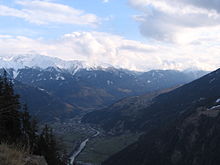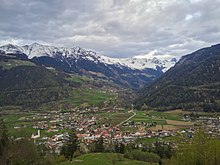You can help expand this article with text translated from the corresponding article in German. (April 2015) Click [show] for important translation instructions.
|
Prutz is a municipality in the Landeck district in the Austrian state of Tyrol. Located at the mouth of the Kauner valley on the upper Inn, it is 10 km south of the city of Landeck and 36 km north of Reschen Pass, that forms the border to Italy. The border to Switzerland is located 23 km away towards the south-west.
Prutz | |
|---|---|
 View of Prutz towards north | |
| Coordinates: 47°04′35″N 10°39′49″E / 47.07639°N 10.66361°E | |
| Country | Austria |
| State | Tyrol |
| District | Landeck |
| Government | |
| • Mayor | Heinz Kofler |
| Area | |
| • Total | 9.74 km2 (3.76 sq mi) |
| Elevation | 864 m (2,835 ft) |
| Population (2018-01-01)[2] | |
| • Total | 1,825 |
| • Density | 190/km2 (490/sq mi) |
| Time zone | UTC+1 (CET) |
| • Summer (DST) | UTC+2 (CEST) |
| Postal code | 6522 |
| Area code | 05472 |
| Vehicle registration | LA |
| Website | www.prutz.tirol.gv.at |


History
editPrutz, situated on the former Via Claudia Augusta, was a resting place and later post station from Carolingian times, with favourable opportunities for the development of a settlement. The place is first recorded in 1027–1034 as locus qui dicitur Bruttes ("the place called Bruttes") in relation to a dispute over tithes between the bishops' churches of Brixen and Regensburg.[3] The Late Gothic parish church was refurbished in the Baroque style in the 17th century.
In 1903 a disastrous fire destroyed the greater part of the village, although the typical West Tyrolean layout of close housing still remains in the centre.
Prutz was originally administratively part of Ried im Oberinntal, which was dissolved as an administrative unit in 1978, when Prutz became part of Landeck.
Geography
editPrutz is situated at the intersection of the rivers Inn and Faggenbach. The recreation area and nature park Kaunergrat is located at the east of the village. The skiing resort Serfaus-Fiss-Ladis is located to the west of the village.
Prutz is located on the cycling route Via Claudia Augusta.
Climate
edit| Climate data for Prutz (1971–2000) | |||||||||||||
|---|---|---|---|---|---|---|---|---|---|---|---|---|---|
| Month | Jan | Feb | Mar | Apr | May | Jun | Jul | Aug | Sep | Oct | Nov | Dec | Year |
| Record high °C (°F) | 13.5 (56.3) |
18.0 (64.4) |
22.4 (72.3) |
25.0 (77.0) |
30.5 (86.9) |
33.4 (92.1) |
35.5 (95.9) |
33.6 (92.5) |
29.3 (84.7) |
25.3 (77.5) |
20.0 (68.0) |
15.2 (59.4) |
35.5 (95.9) |
| Mean daily maximum °C (°F) | 2.2 (36.0) |
4.9 (40.8) |
9.9 (49.8) |
13.4 (56.1) |
18.6 (65.5) |
21.5 (70.7) |
23.8 (74.8) |
23.4 (74.1) |
20.0 (68.0) |
14.7 (58.5) |
7.0 (44.6) |
2.8 (37.0) |
13.5 (56.3) |
| Daily mean °C (°F) | −2.9 (26.8) |
−1.2 (29.8) |
3.0 (37.4) |
6.6 (43.9) |
11.4 (52.5) |
14.3 (57.7) |
16.2 (61.2) |
15.7 (60.3) |
12.2 (54.0) |
7.3 (45.1) |
1.5 (34.7) |
−2.0 (28.4) |
6.8 (44.2) |
| Mean daily minimum °C (°F) | −6.3 (20.7) |
−5.1 (22.8) |
−1.4 (29.5) |
1.8 (35.2) |
5.9 (42.6) |
8.8 (47.8) |
10.7 (51.3) |
10.5 (50.9) |
7.3 (45.1) |
3.0 (37.4) |
−1.8 (28.8) |
−5.1 (22.8) |
2.4 (36.3) |
| Record low °C (°F) | −22.0 (−7.6) |
−18.8 (−1.8) |
−17.6 (0.3) |
−8.0 (17.6) |
−5.9 (21.4) |
0.6 (33.1) |
3.2 (37.8) |
1.0 (33.8) |
−4.4 (24.1) |
−7.8 (18.0) |
−17.5 (0.5) |
−19.2 (−2.6) |
−22.0 (−7.6) |
| Average precipitation mm (inches) | 31.9 (1.26) |
30.2 (1.19) |
31.3 (1.23) |
26.1 (1.03) |
53.6 (2.11) |
86.2 (3.39) |
98.6 (3.88) |
99.2 (3.91) |
61.4 (2.42) |
40.1 (1.58) |
39.7 (1.56) |
35.3 (1.39) |
633.6 (24.94) |
| Average snowfall cm (inches) | 17.8 (7.0) |
19.2 (7.6) |
6.4 (2.5) |
1.2 (0.5) |
0.2 (0.1) |
0.0 (0.0) |
0.0 (0.0) |
0.0 (0.0) |
0.0 (0.0) |
0.0 (0.0) |
5.0 (2.0) |
15.8 (6.2) |
65.6 (25.8) |
| Average precipitation days (≥ 1.0 mm) | 5.4 | 4.5 | 5.0 | 5.2 | 9.5 | 11.1 | 12.0 | 11.9 | 8.5 | 6.4 | 6.4 | 6.2 | 92.1 |
| Average relative humidity (%) (at 14:00) | 62.9 | 53.4 | 43.5 | 43.1 | 44.2 | 45.9 | 46.7 | 48.7 | 48.0 | 50.7 | 59.5 | 67.3 | 51.2 |
| Mean monthly sunshine hours | 71.6 | 92.1 | 121.9 | 134.1 | 170.2 | 166.3 | 192.7 | 173.0 | 141.2 | 119.9 | 79.5 | 64.7 | 1,527.2 |
| Percent possible sunshine | 47.5 | 55.6 | 55.2 | 51.9 | 52.6 | 50.1 | 57.0 | 60.1 | 61.7 | 60.2 | 51.4 | 46.4 | 54.1 |
| Source: Central Institute for Meteorology and Geodynamics[4] | |||||||||||||
Demographics
editThe population of Prutz was declining in the second half of the 19th century inter alia because of the emigration to the Americas at this period but started to grow steadily from 1910 onwards.[5] As of 2013, 12% of the total population were of foreign nationality. The foreign population was divided as such: 43% of the foreigners were EU citizens, 28% were Turkish citizens, 20% were from countries of former Yugoslavia and some 9% were of other nationalities.[6] Evolution of the population can be seen in the table below.
| Year | Pop. | ±% |
|---|---|---|
| 1869 | 589 | — |
| 1880 | 559 | −5.1% |
| 1900 | 506 | −9.5% |
| 1910 | 473 | −6.5% |
| 1923 | 553 | +16.9% |
| 1934 | 591 | +6.9% |
| 1961 | 853 | +44.3% |
| 1971 | 1,206 | +41.4% |
| 1981 | 1,320 | +9.5% |
| 1991 | 1,444 | +9.4% |
| 2001 | 1,670 | +15.7% |
| 2011 | 1,741 | +4.3% |
| 2016 | 1,777 | +2.1% |
Economy and infrastructure
editOne of the biggest hydroelectric power plants of Austria is located in Prutz and operated by Tiroler Wasserkraft. The hydro-power plant is linked by a 14.8 km long pipe to the Gepatschspeicher (Gepatsch Reservoir), which was constructed in 1964. Average electricity production per year is 661 GWh. Many of the neighbouring communities are major tourist resorts, whereas Prutz is home to a number of small businesses that serve the surrounding area.
The village is home to one of Austrias biggest sledge production plants. Several agricultural fields are located in the village including an apricot plantation that serves a distillery. The village also claims the highest located winery of Austria.
Culture and sights
editThe local football club, SV Prutz, hosts an annual musical festival on the pentecost weekend where often nationally recognized artists are performing. Other clubs that are active in the village include an orchestra group, the voluntary firebrigade, a shooting club, the distiller association and a carnival group.
In 1212 a special fountain was discovered that is called Saurbrunn Quelle today. The water from the fountain contains iron, calcium, magnesium and sulfur and is of carbonic nature. It is known for its special healing character. The village has built a resting place around the fountain where the water is made available to the public free of charge.
Other main sights in the village include:
- The parish church of the Ascension of the Virgin Mary (Pfarrkirche Mariä Himmelfahrt), with Chapel of St Anthony, graveyard with two chapels and adjoining priest's house
- Kaltenbrunner Chapel at the southern end of the village
- Lourdes Chapel and Calvary in Entbruck
- Tullen Chapel to the south-west of the old Inntal road
- Wiesele, a former hermitage on a wooded mountain slope
- Late Gothic houses in the village centre, and two outlying towers
- Pontlatz bridge, an iron parallel bridge of 1899
Transportation
editInnsbruck Airport is the closest available airport and is located 80 km away from Prutz. The next train station is Landeck-Zams railway station that is located 20 km away and is connected with a bus. A regular bus service is further maintained to Kaunertal, Scuol and Serfaus.
People
edit- Joseph Schwarzmann (1806–1890), a distinguished ornamental painter in Munich, honorary citizen of Speyer
- Johann Piger (1848–1932), sculptor in Salzburg
References
edit- ^ "Dauersiedlungsraum der Gemeinden Politischen Bezirke und Bundesländer - Gebietsstand 1.1.2018". Statistics Austria. Retrieved 10 March 2019.
- ^ "Einwohnerzahl 1.1.2018 nach Gemeinden mit Status, Gebietsstand 1.1.2018". Statistics Austria. Retrieved 9 March 2019.
- ^ Martin Bitschnau; Hannes Obermair (2009), Tiroler Urkundenbuch, II. Abteilung: Die Urkunden zur Geschichte des Inn-, Eisack- und Pustertals. Bd. 1: Bis zum Jahr 1140 (in German), Innsbruck: Universitätsverlag Wagner, pp. 173–174 Nr. 200, ISBN 978-3-7030-0469-8
- ^ "Klimadaten von Österreich 1971–2000 – Tirol-Prutz" (in German). Central Institute for Meteorology and Geodynamics. Archived from the original on 12 October 2019. Retrieved 3 November 2019.
- ^ "Gemeinde auf den Blick" (PDF). Statistik Austria. Retrieved 2016-10-02.
- ^ "Demographische Daten Tirol 2013" (PDF). Landesstatistik Tirol. Retrieved 2016-10-02.

